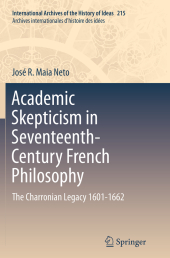 Neuerscheinungen 2016Stand: 2020-02-01 |
Schnellsuche
ISBN/Stichwort/Autor
|
Herderstraße 10
10625 Berlin
Tel.: 030 315 714 16
Fax 030 315 714 14
info@buchspektrum.de |

José R. Maia Neto
Academic Skepticism in Seventeenth-Century French Philosophy
The Charronian Legacy 1601-1662
Softcover reprint of the original 1st ed. 2014. 2016. xii, 165 S. 1 SW-Abb. 235 mm
Verlag/Jahr: SPRINGER, BERLIN; SPRINGER INTERNATIONAL PUBLISHING 2016
ISBN: 3-319-38188-1 (3319381881)
Neue ISBN: 978-3-319-38188-6 (9783319381886)
Preis und Lieferzeit: Bitte klicken
This book is the first systematic account of Pierre Charronīs influence among the major French philosophers in the period (1601-1662). It shows that Charronīs Wisdom was one of the main sources of inspiration of Pierre Gassendiīs first published book, the Exercitationes adversus aristoteleos . It sheds new light on La Mothe Le Vayer, who is usually viewed as a major free thinker. By showing that he was a follower of Charron, La Mothe emerges neither as a skeptical apologist nor as a disguised libertine, as combatting superstition but not as irreligious. The book shows the close presence of Charron in the preambles of Descartesī philosophy and that the cogito is mainly based on the moral Academic self-assurance of Charronīs wise man. This interpretation reverses the standard view of Descartesī relation to skepticism. Once this skepticism is recognized to be Charronīs Academic one, it is seen not as the target but as the source of the cogito. Pascal is the last major philosopher for whom Charronīs wisdom is crucially relevant. Montaigne and Descartes influenced, respectively, Pascalīs view of the Pyrrhonian skeptic and of the skeptical main arguments. The book shows that Charronīs Academic skeptical wise man is one of the main targets of his projected apology for Christianity, since he considered him as a threat and counter-example of the kind of Christian view of human beings he believed. By restoring the historical philosophical relevance of Charron in early modern philosophy and arguing for the relevance of Academic skepticism in the period, this book opens a new research program to early modern scholars and will be valuable for those interested in the history of philosophy, French literature and religion.
Chapter 1: Introduction.- Chapter 2: Charronīs Academic Skeptical Wisdom.- Chapter 3: Gassendiīs Attack on Dogmatic Science.- Chapter 4: La Mothe Le Vayerīs Attack on Belief and Superstition.- Chapter 5: Descartesīs Rehabilitation of Science.- Chapter 6: Pascalīs Rehabilitation of Christian Faith.- Chapter 7: Conclusion.- Bibliography.- Index Nominum.
"It was refreshing to read a history of the development of philosophy in the first half of the seventeenth century that focused on topics that are important to everyone-wisdom, humility, freedom-and not merely interesting to professional philosophers. ... Many readers, not just specialists in the history of skepticism, will derive much benefit and enjoyment from reading Maia Netoīs work." (Michael W. Hickson, International Journal for the Study of Skepticism, Vol. 08 (2), 2018)
"In recent scholarship, this is the first effort at a more systematic consideration of aspects of Charronīs influence. ... The work offers many interesting textual comparisons and interpretative hypotheses in a concise way, well-informed by recent scholarship. It provides good support for the more general claim that Academic skepticism ... ." (Luiz Eva, Journal of the History of Philosophy, Vol. 55 (1), January, 2017)
José R. Maia Neto is Professor of Philosophy at the Universidade Federal de Minas Gerais, Belo Horizonte, Brazil. He has published Machado de Assis, The Brazilian Pyrrhonian (Purdue U. P., 1994) and The Christianization of Pyrrhonism: skepticism and faith in Pascal, Kierkegaard and Shestov (Kluwer, 1995). With Richard H. Popkin, he edited Skepticism in Renaissance and Post-Renaissance Thought (Humanity Books, 2004) and Skepticism: an anthology (Prometheus Books, 2007). With Gianni Paganini, he edited Renaissance Scepticisms (Springer, 2009) and with Paganini and John Christian Laursen, Skepticism in The Modern Age: building on the work of Richard Popkin (Brill, 2009). He has published many articles and chapters on early modern skepticism in English, French and Portuguese.


